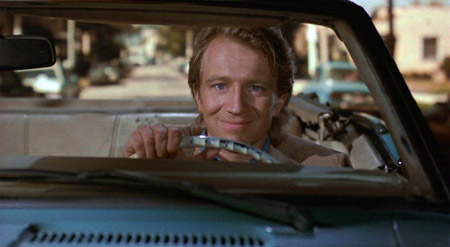PART OF "SUNSHINE NOIR" FILM SERIES AT BAMcinématek
 BAMcinématek in Brooklyn began a "Sunshine Noir" film series last night (Wednesday) with a screening of William Friedkin's To Live and Die in L.A. Brian De Palma's Body Double is included in the series, and will screen this Tuesday, December 2nd. The series "explores what happens when noir steps out of the shadows and into the neon-lit boulevards of LA," according to the BAM website. "Burrowing beyond the glitz and glamour of Tinseltown, these hard-boiled tales of outsiders and antiheroes expose the seedy underbelly of the City of Angels." There are almost too many great movies in the series to name them all here, but today and tomorrow, Roman Polanski's Chinatown will play, and on December 8 will be Paul Thomas Anderson's new film, Inherent Vice.
BAMcinématek in Brooklyn began a "Sunshine Noir" film series last night (Wednesday) with a screening of William Friedkin's To Live and Die in L.A. Brian De Palma's Body Double is included in the series, and will screen this Tuesday, December 2nd. The series "explores what happens when noir steps out of the shadows and into the neon-lit boulevards of LA," according to the BAM website. "Burrowing beyond the glitz and glamour of Tinseltown, these hard-boiled tales of outsiders and antiheroes expose the seedy underbelly of the City of Angels." There are almost too many great movies in the series to name them all here, but today and tomorrow, Roman Polanski's Chinatown will play, and on December 8 will be Paul Thomas Anderson's new film, Inherent Vice.In previewing the series, Blouin Art Info's Craig Hubert states, "Noir was born in Southern California." Here is an excerpt in which Hubert discusses several of the films in the series, including Body Double:
The cynicism of “Chinatown” opened up the floodgates for a new strain of bitter Sunshine Noir. But there were also increasing levels of pollution and the emergence of postmodern architecture in Los Angeles (the glass cylinders of the Bonaventure Hotel were constructed between 1974 and 1976) that made the city feel more inhuman. As we crossed into the 1980s, and the former Governor of California was the President of the United States, Sunshine Noir took the city’s nickname, “The Big Orange,” quite literally. William Friedkin’s “To Live and Die in L.A” (1985), screening on November 26, presents a city cast under an atomic tangerine sky as if illuminated by a Dan Flavin fluorescent glow. Demarcated lines of good and evil were completely eroded, with police officers performing robberies and artists counterfeiting money in their painting studio. Jim McBride’s pop-art remake of Godard’s “Breathless” (1983), screening on December 4, takes place in a candy colored Los Angeles where past and present, the Hollywood myth and the tarnished reality, have collided. Both films end ambiguously, portraying Los Angeles as an inescapable landscape of continual violence.The first sign that the bitterness of the post-“Chinatown” era of Sunshine Noir was mutating once again was Brian De Palma’s “Body Double” (1984), screening December 2, which used John Lautner’s Chemosphere as the swank bachelor pad of the main character, a struggling b-movie actor, and the site where he witnesses a murder. The new sanitized Los Angeles of glass buildings is just a veneer for the city’s inherent seediness, where blood can still stain your minimalist furniture. Michael Mann’s "Heat” (1995), screening on November 6, is the prime result of this shift. The bloated crime drama fully takes place in this Los Angeles, where crimes of passion have been completely erased by crimes of commerce — everything is a transaction, everything is business. Criminals and cops can sit down for a meeting at a diner and nobody blinks and eye. They are practically interchangeable, and both sides have shootouts in the business district wearing Versace suits. Sunshine Noir takes on a different meaning here. The light of Los Angeles is a false light, illuminated from the inside of sprawling towers. A different, softer glow, but nothing has changed.
Paul Thomas Anderson’s “Inherent Vice” (2014), screening December 8, opens up a new chapter, once again looking to the past. Adapted from the novel by Thomas Pynchon, it presents a vision of Los Angeles that has not stopped believing in its own myths but completely wigged out on an overdose of them. Hippiedom is just another variation of the tangled lie of prosperity, and Pynchon’s world is one of confusion and paranoia. This is Sunshine Noir pushed to absurdist proportions, where the most far-fetched conspiracies suddenly seem possible, and the rotten core of the municipality stretches beyond the city limits. But it’s also the Sunshine Noir that speaks to our present condition. Take a look at the news and you’ll realize it’s closer to the truth than you want to admit.
-------------------------------



